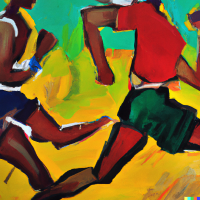ACL Surgery and My Cross Country Season
by Afton
(California)
I tore my ACL about a month ago playing lacrosse, and I'm scheduled for reconstructive surgery in about two weeks. The MRI showed some meniscus damage as well. I'm 16 and was hoping to run cross country in 4-5 months; surgery is a definite setback.
Should I go through with cross country this fall? Should I run with the team but not compete? Season starts right when school does. What is the likelihood of redamaging my ACL?
Answer by Dominique:

Thank you for your question regarding your upcoming ACL reconstruction. The ACL (=anterior cruciate ligament) is one of the big ligaments around the knee joint. It plays an important part in stabilization of the knee.
Recovery after an ACL reconstruction surgery is a gradual process that typically takes several months. While individual experiences may vary, I can provide you with a general overview of what to expect during the recovery period.
1. Early stages (first few days to weeks)
2. Intermediate stages (weeks to a few months)
3. Advanced stages (a few months to a year)
4. Staying fit while you are recovering
Early Stages
Intermediate Stages

Advanced Stages
Staying Fit While You Are Recovering

So, as you see, you could possibly start getting back to reasonably normal activity levels in 3-4 months. For many people this is generally the case, but your individual circumstances may make your recovery period longer.
Work with the doctor who is treating you and try to understand what you can and cannot do. Not being able to run is a setback, but that does not mean that you need to sit still. There may be other types of sports you are still allowed to do that help your legs get stronger and help you maintain your fitness levels.
After full recovery you should have a fully functioning knee again. Don't blow it by wanting to rush back into running. I understand that cross country can be important to you, but you will need that knee for a bit longer than the next cross country season! So, work with your doctor and make sure you make full recovery before you throw yourself into some crazy running training program. And, lastly, you are still young. You have a lifetime of running ahead of you. Maybe this surgery means you may not be able to participate in cross-country next season, but there will be many more seasons and years to run!
Best of luck with the surgery. I hope you will make a speedy recovery.
Kind regards,
Dominique
Helpful
Resources
-
Beginner Running Tips
Are you a beginning runner? Then this is your best starting point. Many tips and running programs on offer, dedicated to you.
-
Running for Weight Loss
Aiming to lose a few pounds? Get into the Running for Weight Loss section for tips and advice.
-
Running Training
The Running Training section of the site has got the most articles. It is constantly getting updated with new tips and information. A must-visit if you are serious about improving your running performance.
-
5k Running Tips
The 5k is a great distance to run and train for. The great thing is that you can do it quite often and see big improvements.
-
10k Running Tips
The 10k is a real challenge. You need to run fast for an uncomfortably long time! Check out this section if you are strong of mind and legs!
-
Marathon Running Tips
The marathon is a massive challenge. Proper training is so important! Make sure to check out this section if you have got your mind set on the marathon!





